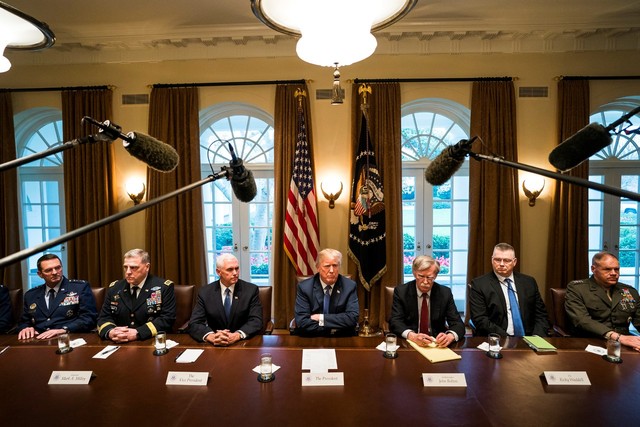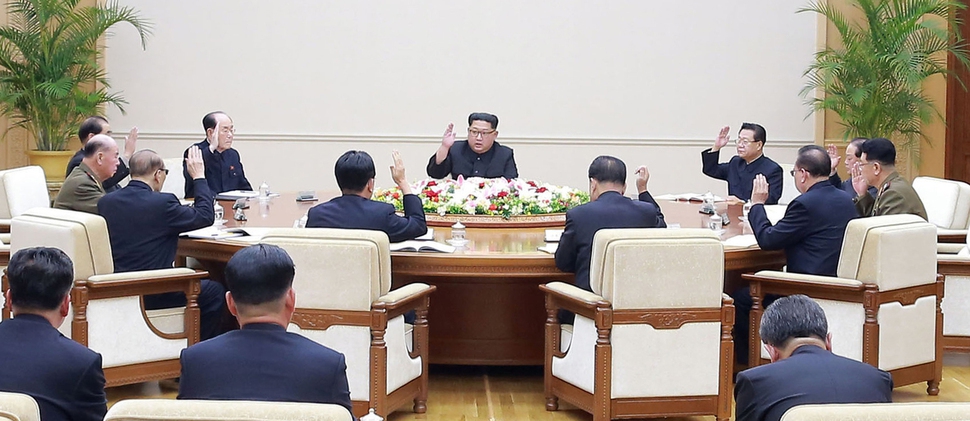 |
|
President Donald Trump scowls while reflecting on the “very unfair” treatment that he is being subjected to by Special Prosecutor Robert Mueller during a meeting with military leaders, Vice President Mike Pence, and new National Security Advisor John Bolton at the White House on Apr. 9. (EPA/Yonhap News)
|
North Korean state-run media makes first announcement regarding planned meeting
US President Donald Trump announced on Apr. 9 that his summit with North Korean leader Kim Jong-un would be taking place “in May or early June” and shared that preliminary discussions had taken place. North Korea’s state-run media also made their first official mention of the US summit and the date and venue for an inter-Korean summit later this month while reporting on Apr. 10 on a Workers’ Party Central Committee Politburo meeting the day before. “We’ve been in touch with North Korea,” Trump said during a Cabinet meeting at the White House on Apr. 9. “We’ll be meeting with [North Korea] sometime in May or early June,” he added. It was Trump’s first official mention of the date for the North Korea-US summit or preliminary discussions for it. Trump’s reference to the date for his summit with Kim and discussions with North Korea at the Apr. 9 Cabinet meeting suggests the summit is proceeding on course. Observers are now looking at the reasons the White House had previously declined to officially confirm the summit date or preliminary discussions. Analysts are pointing to Trump’s remarks predicting “great respect paid by both parties” as especially significant. With mutual respect seen as the basic requirement for a summit, Trump’s statement could be seen as signaling that the two sides have already established some level of trust through multiple behind-the-scenes meetings. Many are now watching to see what kind of acknowledgement Trump extends to the North Korean regime or Kim’s government at the summit. With Trump further sharing his hopes for “a relationship that’s much different than it’s been,” attention is also turning to whether he presents a specific vision for normalizing relations with Pyongyang after the summit. To begin with, Trump’s expression of hopes for a “deal on the de-nuking of North Korea” suggests North Korea has directly mentioned its willingness to denuclearize – at least in general terms – in its discussions with Washington. “During the backchannel meetings, North Korea seems to have indicated a position on the level of denuclearization the US is envisioning,” said Institute for National Security Strategy senior research fellow Cho Sung-ryul. “While we don’t know anything about the specific approach to denuclearization, Trump made those remarks because he was convinced [the two sides] have an agreement on the final goal,” Cho said. Inje University professor Kim Yeon-cheol said, “We can conclude that [the two sides] are approaching this in terms of achieving some kind of results from the summit.” US news outlets previously quoted senior government officials as saying Kim communicated a message to the US on Apr. 8 expressing his readiness to discuss the Korean Peninsula’s denuclearization for the sake of the US summit. But a tense back-and-forth over the nature of the first step toward denuclearization is expected to continue until the summit. Trump’s announcement could signal more active summit preparation Trump’s references to direct meetings with the North and a summit date in “May or early June” are also expected to quiet calls by some Washington experts for the summit’s postponement. His remarks also appear likely to mean more active meetings with Pyongyang to prepare for the meeting. “It is significant that he was speaking during his first gathering with John Bolton in attendance as the new National Security Advisor,” Cho said. “He was treating the North Korea-US summit as a foregone conclusion and sending a message to Bolton that he should focusing on managing things at a practical level rather than making his own arguments,” he suggested. But former South Korean Ambassador to Russia Wi Sung-lac, who served in the past as the Ministry of Foreign Affairs’ special representative for Korean Peninsula peace and security affairs, cautioned against reading too much into Trump’s remarks. A characteristic example of “PR and drumming up public support” “Assuming there have been discussions [between North Korea and the US], the parts about denuclearization and the other things besides the definite date [for the summit] don’t appear to hold any special meaning,” Wi concluded, calling the remarks a characteristic example of “PR and drumming up public support” by Trump.
 |
|
On Apr. 10, the KCNA reported that North Korean leader Kim Jong-un presides over a meeting of the Central Committee of the Korean Workers Party the previous day. (Korean Central News Agency/Yonhap News)
|







